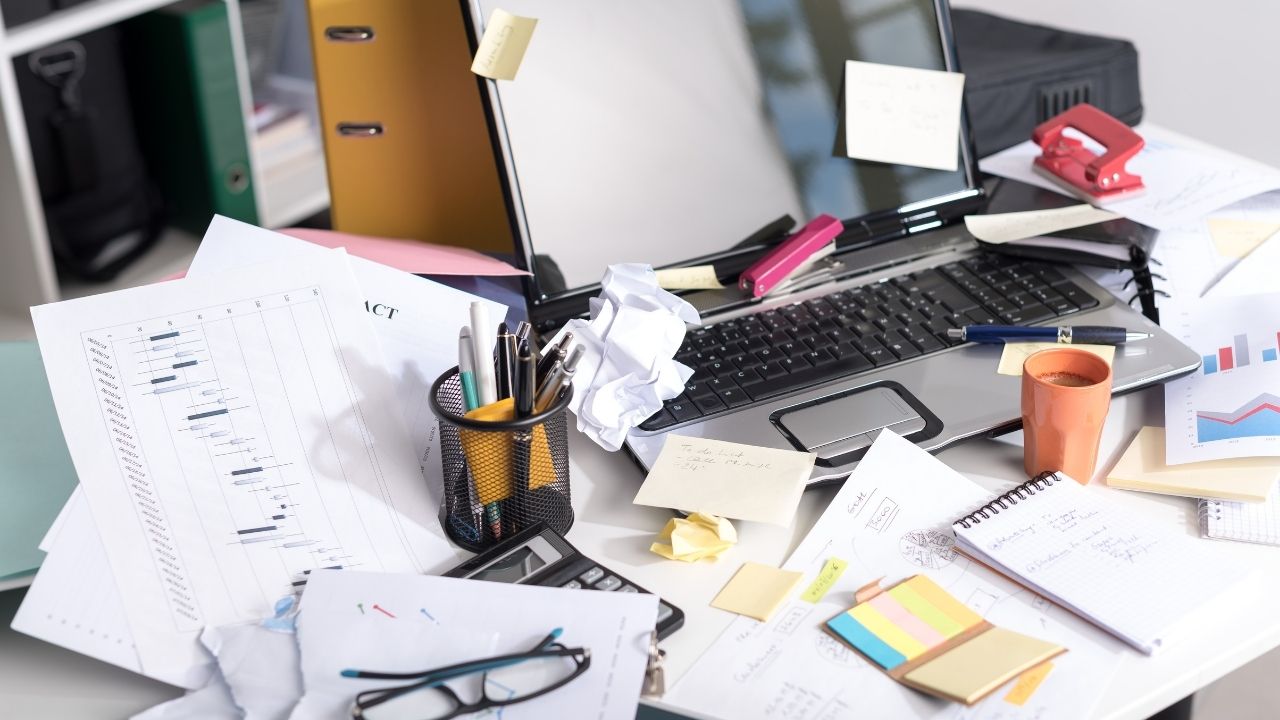- Research shows that clutter in your personal space can impede cognition, emotions, and behavior.
- Having too many things in your personal space can make you feel overwhelmed, and when the brain gets overloaded, it can lead to feelings of stress.
- Having a neat, clean, and organized workspace can improve your productivity and well-being both at work and at home.
In 2020, many videos and articles arose that were designed to help remote workers ‘cover up’ their messy rooms and workspaces on Zoom, by using the background blur feature. Or, more humorously, covering up rooms with background photos of space or other wacky locations.
Covering up your background on Zoom and other video chats has its benefits. Primarily, if your workplace isn’t neat, it can do a good job of keeping it from others. While it’s unlikely that no one will say anything about your untidy room, it also helps to diminish any anxiety you might have about your unkempt space becoming an object of workplace gossip.
What is better than merely covering up your unkempt workspace, however, is organizing and cleaning it up. And this isn’t just because it looks better to have a clean workspace. The opinions of your coworkers on this matter should be at the bottom of your list of priorities.
Rather, there are many reasons related to wellness and productivity as to why you should keep your workspace neat. Each of these reasons is supported by scientific data demonstrating the effectiveness of keeping a neat workspace. This article will illustrate some of these reasons in the hopes of motivating you to take action towards combatting dust-bunnies and desk-clutter!
Neatness is of particular importance for remote workers
One of the best parts of working remotely is the fact that no one is looking over your shoulder telling you what to do. At least not in the same way as an in-person job. Of course, you still have managers and bosses assigning you to work, but for the most part, your responsibilities are largely up to you to fulfill.
This, however, can be a double-edged sword for some. Keep this in mind, as research shows that if you are currently working remotely, you should expect to continue doing so indefinitely if you plan on remaining at your current job.
If you are working remotely, and specifically from home, shirking one’s cleaning responsibilities can happen all too easily. This is even more so the case if your bedroom is hybridized with your workspace.
Thus, if you are a remote worker, you may find that you have to remind yourself more frequently and with greater fervor. Especially if you live on your own, no one else is going to do it for you. When there’s no manager or co-worker who is physically present, you essentially have to become your own boss in these respects.
Messy workspaces diminish productivity and well-being
A messy workspace may seem like a banal thing to worry about. After all, how can clutter really prevent one from getting their work done?
The research on the matter, however, paints a completely different picture. A messy workspace can and does diminish one’s productivity. Consider, for instance, if there is an important paper that you need for work. If your desk is cluttered, or if you have no system of organizing your documents, you will spend needless time frantically searching for this paper.
That example is one of many that is logistical and pragmatic in nature. However, the diminishment in productivity goes beyond these particular matters and has psychological roots.
Each of us have our own personal spaces. Whether they be our home or our workspace, wherever we reside for long periods of time can be considered a personal space.
Research shows that clutter in one’s personal space can impede one’s cognition, emotions, and behavior. In other words, if your personal space is a mess, it makes it more likely that your mind will struggle to focus.
Having too many things in your personal space naturally makes you feel overwhelmed. This is ‘natural,’ because your sensory experience is, quite literally, overloaded with information.
The brain is not an infinite repository of information, and therefore, when it gets overloaded, you become stressed out and cognitively impaired. This is shown not only in subjective self-reports but also in physiological measures –cluttered rooms literally increase cortisol (stress hormone) spikes!
These information overloads are also associated with symptoms of anxiety and depression. For example, let’s say you have a strict deadline approaching at work, and your office is located in your messy room. The deadline is at the forefront of your mind, but so is the messiness of your room.
This makes it more likely that you will procrastinate, and the more you procrastinate, the more worried you will get about the deadline. The human brain isn’t ‘designed’ to focus on multiple tasks at once; when your immediate environment is a screaming task to be dealt with, and you try working in this environment, you are making your brain work overtime to your detriment.
This plays a role in impeding memory as well. Let’s say for instance that you have a list of several tasks to do in a single day. A worker with a cluttered workspace is much more likely to forget some tasks than someone who has a neat workspace.
In other words, if you are finding it difficult to focus on your work, that your quality of work isn’t what you’d like it to be, and you are finding that work has been especially stressful as of late, take a look around. Clean what needs to be cleaned and tidy up what is unorganized.
Having a neat, clean, and organized workspace can improve your productivity and well-being both at work and outside of work. It is worth it to develop a weekly routine of cleaning all of your personal spaces for precisely these reasons. It is one of the most immediate and reliable ways you can help yourself feel better and work better.


















